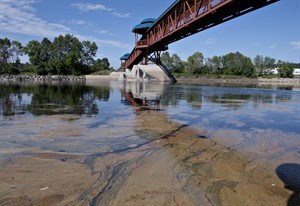
Traces of the oil spill that occurred following a train explosion in Lac-Megantic, Que., is seen about 70 kilometres downstream under a pedestrian bridge in Saint-Georges, Que., on Monday, July 8, 2013. THE CANADIAN PRESS/Jacques Boissinot
July 08, 2013 - 2:48 PM
CALGARY - The train disaster that devastated a Quebec town over the weekend is likely to intensify the debate around transporting crude oil — regardless of whether it's by rail or pipeline, observers say.
Lac-Megantic, Que., is reeling from the oil-fuelled infernos at a time when two proposals are being weighed to ship Western crude east through the province by reconfiguring existing pipelines.
For Adam Scott of Environmental Defence, the concern is more about the dangers of what's inside the pipe or tank cars than how the stuff gets from A to B.
"I think this incident is going to heighten the awareness everywhere across Canada of just how risky transporting oil is through communities," he said.
"And I'm not sure everyone's going to distinguish between train or a pipeline. I think they're both quite dangerous and they both have their own risks."
Campaigns mounted by Environmental Defence and other groups have focused on the origin of the crude being transported — the Alberta oilsands — just as much, or even more than, the means by which it gets to market.
Scott learned about the Lac-Megantic disaster while he was participating in a "healing walk" near Fort McMurray, Alta., hearing from First Nations groups affected by oilsands development.
"It was pretty unbelievable to be actually out there doing that at the same time hearing about on the far side of Canada of the impact that oil is having on communities in Quebec," he said.
"It's been a tough weekend."
Although some may seize on the Lac-Megantic disaster as proof that pipelines are a safer way to transport crude than rail, University of Alberta economist Andrew Leach said he doesn't expect that argument to wash with many Canadians.
Relatively speaking, pipelines might look better than rail, but on an absolute basis, Leach said, concerns about moving crude will be heightened more generally.
"What you're going to see is people saying this shows that you can't transport oil safely," he said.
"I think that's going to be the big message that comes out of this for a lot of people — if it's moving through by pipeline or by rail, you're not going to be able to guarantee safety."
Rail and pipelines play different roles in getting crude oil to market.
While pipelines — many of which have been delayed amid fervent environmental opposition and political wrangling — are seen as a stable, long-term solution, rail is seen as a flexible stop-gap measure and a way to tap into markets that aren't served by pipelines.
"I don't think anyone in the oilpatch was thinking that rail was going to be sort of the ideal full, long-term solution for getting products to market, getting oil to market," said Dylan Jones of the Canada West Foundation think-tank.
"It's clearly been playing a really critical role in dealing with what happens while pipelines are getting approved."
Jones said he doesn't see what happened in Lac-Megantic changing any minds about the safety of rail versus pipeline.
"I don't think for those people who are opposed to pipelines this is going to move them," he said.
"I think that for the people who have long felt that pipelines are the best and safest way to do it, this will certainly affirm their view, but I think this is actually going to intensify what is already a polarized debate."
Jones' main concern is that there needs to be more rigorous government oversight that gives Canadians confidence that dangerous goods can move safely — no matter the means.
"Part of having a successful, strong exporting economy is extremely reliable, independent government regulation in areas of public safety, and that includes the environment," he said.
"At the end of the day, we can't entirely leave it to the market to deal with safety issues."
News from © The Canadian Press, 2013